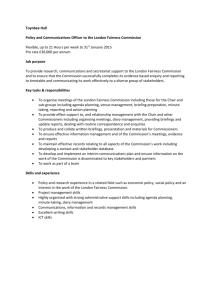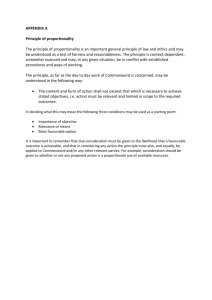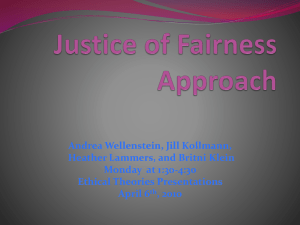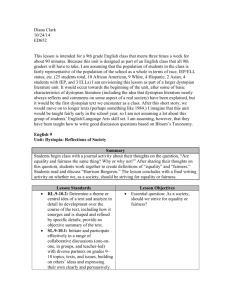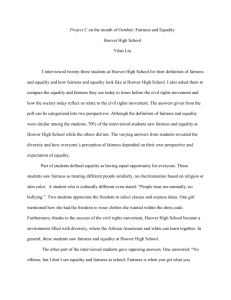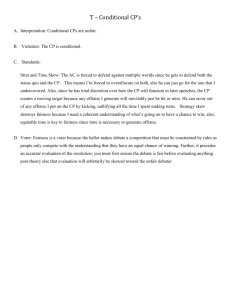The New Culture War over Fairness
advertisement
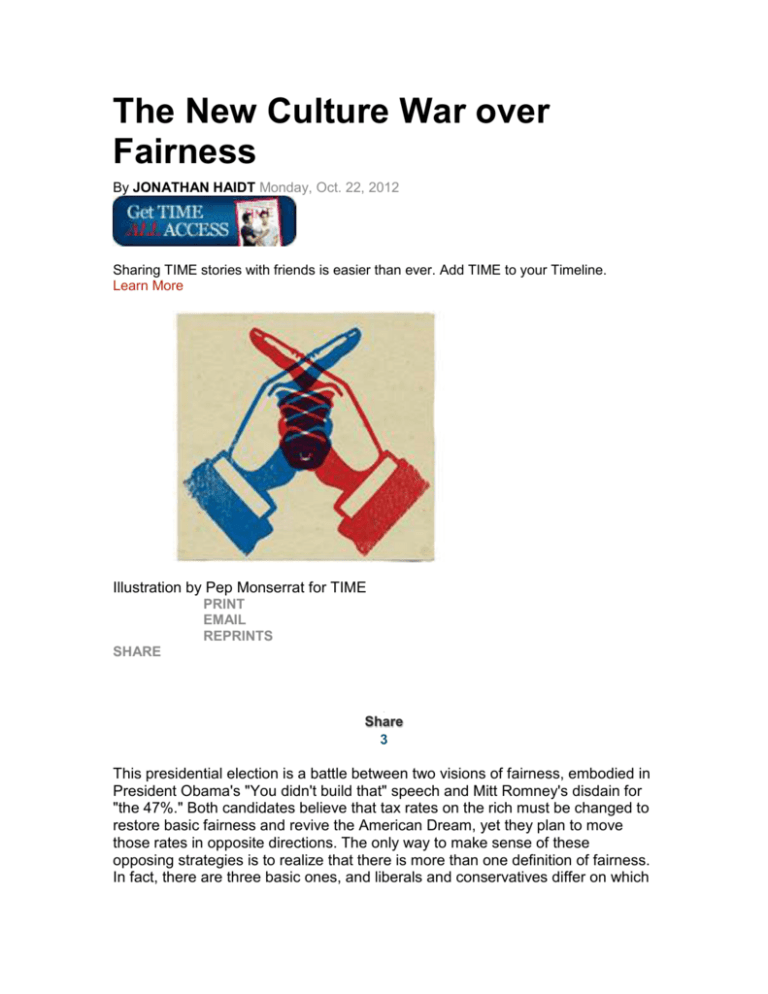
The New Culture War over Fairness By JONATHAN HAIDT Monday, Oct. 22, 2012 Log In with Facebook Sharing TIME stories with friends is easier than ever. Add TIME to your Timeline. Learn More Illustration by Pep Monserrat for TIME PRINT EMAIL REPRINTS SHARE in Share 3 This presidential election is a battle between two visions of fairness, embodied in President Obama's "You didn't build that" speech and Mitt Romney's disdain for "the 47%." Both candidates believe that tax rates on the rich must be changed to restore basic fairness and revive the American Dream, yet they plan to move those rates in opposite directions. The only way to make sense of these opposing strategies is to realize that there is more than one definition of fairness. In fact, there are three basic ones, and liberals and conservatives differ on which they value most. 1. Proportionality Proportional fairness means that people get benefits in proportion to their contributions. Nobody is cheating or getting cheated. If you've ever shared a kitchen with roommates, you know how sensitive people can be about who's doing their fair share and who's the slacker who uses the kitchen but doesn't clean or shop. Everyone--right, left and center--values proportionality, but according to a survey I conducted with colleagues at YourMorals.org conservatives value it more. When 5,200 Americans were asked if they agreed with the statement "Employees who work the hardest should be paid the most," 77% of people who described themselves as "very conservative" when they registered on the site agreed moderately or strongly, compared with 49% of people who described themselves as "very liberal." This is the kind of fairness that pervades the speech in which Romney referred to the 47% of Americans who don't pay income taxes as moochers who believe that they are entitled to be cared for. By the logic of proportionality, people who are not paying into the Treasury should not be drawing benefits out. 2. Equality The second common meaning of fairness is that everyone gets the same amount. Equality is a special case of proportionality. When everyone's inputs are equal, what's fair is that everyone should get the same outcome. With voting, for example, we think that all citizens are equal in their citizenship, so each citizen gets one vote. But what about wealth? Should that be equalized? Here, Americans disagree. Regarding the statement "Ideally, everyone in society would end up with roughly the same amount of money," 42% of very liberal respondents agreed strongly or moderately, compared with just 1% of very conservative voters. Obama seems to be downplaying equality in this campaign after the trouble it brought him in 2008 over Joe the Plumber. When Joe asked whether Obama's plan would raise his taxes if his income rose, Obama said, "It's not that I want to punish your success ... I think when you spread the wealth around, it's good for everybody." But even if Obama never talks about redistribution anymore, many liberals do. Among the most common themes of the protest signs at Occupy Wall Street was the need to raise taxes on the rich to create greater equality. At Tea Party rallies, one never sees signs extolling equality. Fairness is a major theme, but it is almost always fairness as proportionality. Tea Partyers may not be enthusiastic about Romney, but they share his conception of fairness insofar as they believe progressive taxation is a punishment for success and social programs are a reward for failure. 3. Procedural Fairness Read more: http://www.time.com/time/magazine/article/0,9171,2126664,00.html#ixzz29nlclkw b Illustration by Pep Monserrat for TIME PRINT EMAIL REPRINTS SHARE in Share 3 (2 of 2) Procedural fairness means that honest, open and impartial rules are used to determine who gets what. Both liberals and conservatives claim to value procedural fairness, but in a society with massive inequality, the rich have many opportunities to rig the game in their favor. Should we try to level the playing field? Liberals generally say yes, which is why Obama preceded his "You didn't build that" comment with praise of the government programs that helped his parents succeed. Conservatives are ambivalent, which is why Romney blamed social programs for creating a sense of entitlement. He preceded his "47%" comment with praise of his forebears, who succeeded despite the odds, with no help from government. It's not that conservatives don't value procedural fairness. They surely want everyone to play by the rules in their workplaces or when they go to court. It's rather that they see government efforts to level the playing field as a covert attempt to enforce equality of outcomes despite inequality of inputs. So this is where we are as a nation. We all agree that something is broken in the U.S. We all agree that the other side is to blame and that tax policy can be used to restore basic fairness. We just can't agree on what fairness means. Haidt is a professor of business ethics at New York University's Stern School of Business and the author of The Righteous Mind TO READ AN EXPANDED VERSION, GO TO time.com/haidt Read more: http://www.time.com/time/magazine/article/0,9171,2126664,00.html#ixzz29nm6P gKP
